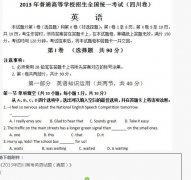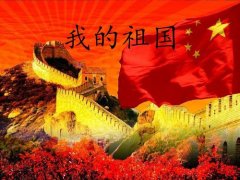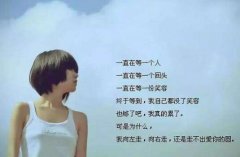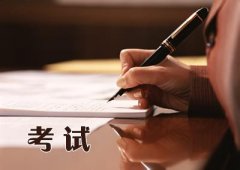外研必修高中英语1-4册课文完形专练(5)
SB3 Module 4 Sandstorms in Asia
Sandstorms have been a ______________(大的灾害) for many ________(亚洲的) countries for centuries. Scientists have tried many ways to ________(解决) this problem and in China, a mass campaign has been started _____________(帮助解决) it.
Sandstorms are strong, dry winds _______ ________(携带) sand. They are often so thick______ you cannot see the sun, and the wind is sometimes strong enough to move sand dunes. The four main places in the world _______ there are sandstorms are Central Asia, North America, Central Africa and Australia. Ren Jianbo, from Inner Mongolia described a terrible sandstorm he _________(体验) as a child in the desert. “___________________(遇到) a sandstorm was a terrible ___________(经历),” he said. “There was nothing to be done. It was the most ___________(令人害怕) and the most dangerous ________ I've ever been in. You just had to hope you'd ________(幸存). I thought I was going to disappear under the sand.”
Northwest China is part of the sandstorm centre in Central Asia. Sandstorms begin in desert areas. Sandstorms in China ____________________(似乎已增加) in recent years as a result of “___________“(沙漠化). This is a _________(过程)_____ happens when land becomes desert because of ___________(气候变化) and because people cut down trees and ___________(挖草).
Sandstorms sometimes_______(影响) Beijing. _______(居民) wake up ____ an orange sky and strong winds ______ cover the city in a thick, brown-yellow dust. The storms sometimes continue all day and ______(交通) moves very slowly because the thick dust makes_____ difficult to see.
The Chinese Central Weather Station can ________(预报) a sandstorm some weeks _______ it arrives in Beijing, but the ________(强大) of the storm sometimes surprises people. When a sandstorm arrives in the city, weather ________(专家) ______(建议) people not to go out. Huang Xiaomei, _____ lives in Beijing says, “To be cycling in a sandstorm is __________(令人恐怖的). The winds are very strong. It's difficult to breathe(呼吸) and the dust makes me _____. So if you want to go out, you'd better ________(戴面具).”
The desert is only 250 kilometres away to the west of Beijing. ___________________ (为了阻止沙尘暴来)nearer, the ___________(政府) is planting trees. Already it has planted more than 30 billion trees and _____________________(计划继续种) for the next five years.
The Green Movement
Some countries are better than others at looking after the __________(环境). In Europe, Germany and the northern European countries work very hard to ______________(改善环境). People in countries such as Germany put their ________(垃圾) into different bags—paper in one bag, _______(塑料) in another bag, etc. The _______(垃圾) is then taken away and, if possible, _________(循环). CFCs (chlorofluro-carbons), ______ _______ are found in refrigerators and aerosol cans, are not allowed. There are laws _____ do not ______ people to burn too much coal.
In__________(二十世纪七十年代), as people learnt more about __________(环境) problems, the “Green” movement began and soon__________(传播) all over Europe. The “Green” movement tries to _______(使) governments to think seriously(认真) about the_________(环境) and how to look after it. It _________(收集)information about how industry is _____________________(破坏环境) and gives this information to newspapers.
SB3 Module 5 Reading
填空题(一空一词)
_______(古代的) China was a place _______ states were often _____ ______((打仗) with each other. But it was also a time _____ there were many great _________(哲学家). Confucius (551 BC–479 BC) is one _______ ______(影响) has been the greatest. He ______(强调) the _________(重要性) of _______((善良), duty and _____(秩序) in _______(社会). Chinese _______(社会) was ________(影响) by these ideas for more than 2,000 years.
Mencius was a thinker _______ teachings were very similar to ______of Confucius. Mencius was born in 372 BC. His father died when he was young, and he was _____ _______(抚养) by his mother. He became a student of Confucius's ideas, and was then given an important _______(职位) in the _________(政府) of a state. However, when he saw that the _______(统治者)was not following his advice, he _______(辞职). For many years he travelled from state to state, ________(teach) the ________(原则) of Confucius. He then became an _______(顾问) to another _______(统治者). He spent his last years _______(prepare) a book of his teachings _______(call) The Book of Mencius. Mencius believed that the reason ______ man is different from animals is _____ man is good. He taught that_____ the government was kind, then people would be good. He believed that people were more important than _____(统治者), and hated the state when it treated people badly.
Mozi was another teacher ______ was very _________(有影响力). _______(bear) in 476 BC, he came from a family _______ was very poor. He became famous for his unusual clothes and _______(行为). Mozi founded the _______(哲学) ______(call) Mohism. _________(从一些方面), his________(信仰) were similar to _______of Confucius. For example, he considered that ________(政府) was most important. As a result, he spent many years trying to find a state _______ people would follow his teachings. Mozi believed that all men were _______(平等的). His idea of love was different from the Confucian idea of kindness. Mozi taught that we should love all _____ ______(人类) and look after those ______ are weaker than ourselves. He hated the idea of war. Mozi died in 390 BC.
The Industrial Revolution
In Europe, in the second half of the eighteenth century, there was an important change in (社会)society. This change was called the “_______(工业)Revolution”. Until then Europe had been a farming ______(社会). With the Revolution, factories appeared and _____ _______(批量生产)became possible for the first time. The factories were built in towns and as a result, the population of towns and cities _______(great) increased.
These changes became possible because of inventions such as the ______(蒸汽)engine _______(invent) in 1769 by James Watt and the main _______ ______(能量来源)during the _______(工业) Revolution. At first the steam engine was used in ______(矿井), but it was soon used in factories and on the_______(铁路).
During the Revolution, factory owners became more powerful than land owners. Thousands of people left the countryside to work in the city. Often, factory workers lived in poor and ________(拥挤) conditions. From 1830 to the early 20th century, the Revolution ________(传播) through Europe and the US and then to other countries such as Japan.
SB3 Module 6 The Three Gorges Dam
Mao Zedong wrote a _______(诗歌)______ ______he dreamed of “walls of stone to ____ _____(阻挡) clouds and rain till a _______(平滑的) lake rises in the ______(狭窄的)gorges”. Now his dream has _____ _______(实现). The ______(动力) of the Yangtze River, ____ is the world's third longest river, has been harnessed by the Three Gorges Dam.
The Three Gorges Dam, ______ is the biggest ______ ______(建筑工程) in China since the ______(build) of the Great Wall and the Grand ______(运河), has been built to control flooding and provide ______ ______(水电动力) for the ______ ______(中部地区) of China. The dam is nearly 200 metres high and 1.5 kilometres wide. It has ______ (花钱)more than any other in history.
Sun Yat-sen, ______ was the leader of the 1911 ______(革命), first suggested the idea of a dam across the Yangtze River in 1919. ______ ______(四分之三) of China's ______(能源) is produced by burning coal. In 1993, China used 1.2 billion tons of coal for heating and generating ______(电). ______(不幸的是), ______(burn)coal causes serious air pollution and increases ______ ______(地球升温). The dam will generate ______(电) equal to about 40 million tons of coal without causing so much air pollution.




